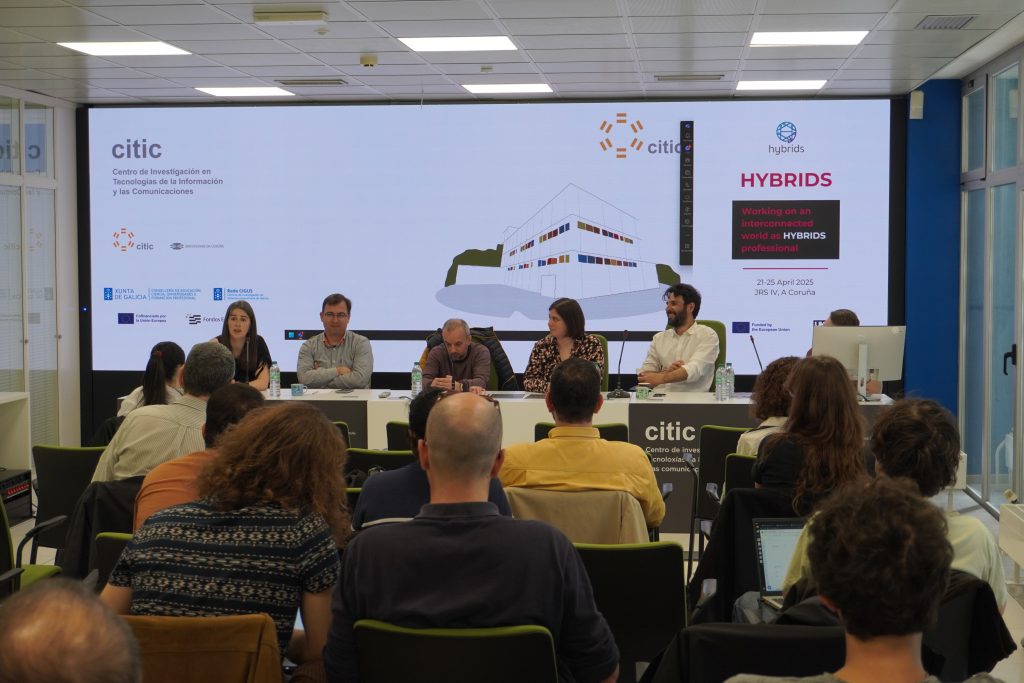
The European Project HYBRIDS Concludes Its Fourth Joint Session at CITIC of the UDC, Strengthening Alliances Against the Challenges of Disinformation
- As a conclusion to the meeting, a joint session was held on Friday between HYBRIDS and the European project AI-CODE, which focuses on the challenges posed by next-generation social networks.
- Algorithmic transparency, ethics in AI, and the development of intelligent systems that adequately integrate the human dimension were among the topics addressed.
- Researchers from various countries shared synergies and outcomes from the development of cross-disciplinary competencies between social sciences and computer science.
A Coruña, April 28, 2025.- The Centre for Research in Information and Communication Technologies (CITIC) of the University of A Coruña hosted last week the fourth joint meeting of the European project HYBRIDS (Fostering Hybrid Human-Artificial Intelligence), an initiative funded by the European Commission’s Horizon 2020 programme, which promotes an innovative and multidisciplinary approach to the field of hybrid artificial intelligence.
Since Monday, researchers from various disciplines and countries have gathered at CITIC’s facilities to advance the scientific objectives of the project, share results, strengthen synergies between working groups, and continue developing cross-disciplinary competencies between social sciences and computer engineering.
The event, named Joint Research Session IV, is part of the training and collaborative plan of the HYBRIDS project and combines scientific sessions, collaborative dynamics, and workshops aimed at enriching the interaction between early-stage PhD researchers and international experts. Topics addressed included algorithmic transparency, AI ethics, and the development of intelligent systems that properly integrate the human dimension.
Ethical Networks
In a context of increasing spread of fake news, disinformation, and hate speech through social networks, HYBRIDS aims to move towards hybrid intelligence systems that integrate structured knowledge from the humanities with natural language processing tools and deep learning algorithms. This combination seeks to overcome the limitations of current AI systems, providing greater reasoning capability, understanding, and cultural context in language processing.
This hybrid approach responds to the urgent need to protect modern democracies, which rely on free access to verified and reliable information. HYBRIDS trains researchers with multidisciplinary profiles capable of creating ethical, effective, and technically sound tools to detect and counter digital disinformation, thus contributing to the sustainability of responsible democratic practices in Europe.
Joint Event with the AI-CODE Project
As the closing activity of the week-long event, on Friday, April 25, a joint session took place between HYBRIDS and the European project AI-CODE, which focuses on the challenges posed by next-generation social networks. AI-CODE explores how to leverage artificial intelligence tools to help media professionals combat disinformation and improve the quality of public discourse. This collaboration between both projects highlights the need for collaborative and interdisciplinary approaches in the face of one of today’s greatest societal challenges: the integrity of information in the digital environment.
The Project
HYBRIDS is funded by the European Union under the Horizon Europe Marie Skłodowska-Curie Actions (HE MSCA) and co-funded by UK Research and Innovation (UKRI) through the Horizon Europe Guarantee scheme. HYBRIDS is a Marie Skłodowska-Curie doctoral network that brings together early-stage researchers to develop advanced and interdisciplinary competencies. It focuses on integrating human and artificial intelligence to address challenges such as disinformation and hate speech, while promoting collaboration between academia and industry.
Coordinated by the Singular Research Centre in Intelligent Technologies at the University of Santiago de Compostela, the project involves associated universities, leading research centres, non-profit organizations, and innovation-driven companies from across Europe: Université de Caen (France), Universidade da Coruña (Spain), Universidade de Évora (Portugal), Radboud Universiteit (Netherlands), Queen Mary University of London (UK), Spanish National Research Council (CSIC, Spain), Fondazione Bruno Kessler (Italy), GESIS – Leibniz Institute for the Social Sciences (Germany), Fondazione Openpolis ETS (Italy), Fundación Universidad Empresa Gallega (Spain), Factoria de software e multimedia SL (IMAXIN, Spain), Industrieanlagen Betriebsgesellschaft MBH (IABG, Germany), Newtral (Spain), and Università di Padova (Italy).
For more information about the HYBRIDS project and its activities: https://hybridsproject.eu





